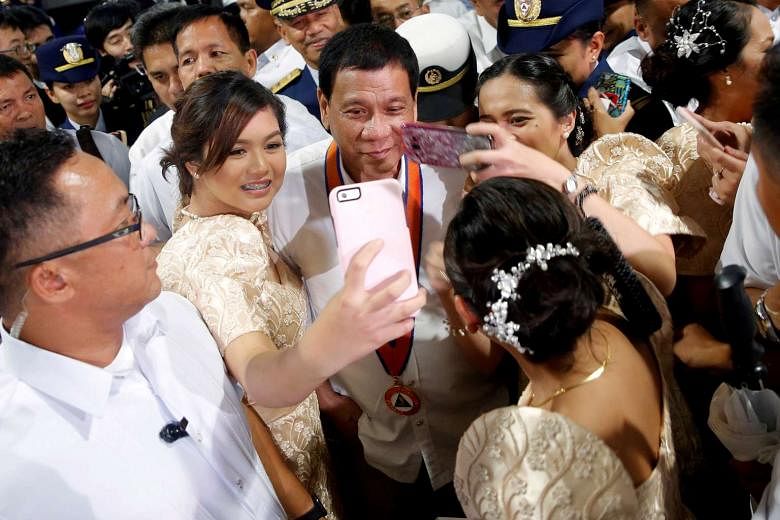TOKYO (REUTERS) - Philippine President Rodrigo Duterte softened his remarks about a "separation" from long-time ally the United States on the eve of a visit to Japan, a country worried about Manila's apparent pivot away from Washington and towards China.
"The alliances are alive," Mr Duterte told Japanese media in Manila on Monday (Oct 24), Kyodo News reported.
"There should be no worry about changes of alliances. I do not need to have alliances with other nations."
The remarks will be welcomed by Prime Minister Shinzo Abe, who wants to keep ties with the Philippines tight during Mr Duterte's visit to Japan, starting on Tuesday.
Mr Duterte jolted the region last week on a trip to China when he announced a realignment towards Beijing, the latest in a series of outbursts against the United States.
Mr Duterte's aides and the President himself later tried to clarify that he did not mean he was cutting ties with the United States and his remarks on Monday were the most conciliatory yet.
He told Japanese media that he had been expressing a personal opinion, not speaking for the government when he mentioned separating from Washington, the Nikkei newspaper said. He said he only plans to have an "alliance of trade and commerce" with China, Kyodo reported.
Mr Abe, who has sought to strengthen ties with the Philippines and other South-east Asian countries as a counter-balance to a rising Beijing, will be trying to wed Manila to Tokyo's side without prompting a backlash that pushes it closer to China.
"It's certainly unfortunate and we are worried, but such things will not change Japan's commitment to the Philippines," said Mr Narushige Michishita, a professor at the National Graduate Institute for Policy Studies and former defence official, referring to Mr Duterte's comments.
Meanwhile, US Secretary of State John Kerry, after talking to his Philippine counterpart on Sunday, is confident the two countries can "work through" a period of confusion caused by Mr Duterte's remarks, the State Department said.
Japanese officials said Mr Abe would not overtly try to mediate between Tokyo and Washington.
Foreign Minister Fumio Kishida will meet Mr Duterte on Tuesday for a low-key dinner, and Mr Abe will hold rare one-on-one talks with Mr Duterte at his residence in Tokyo the next evening following a larger, more formal meeting with senior officials.
"I don't think he has any negative feeling towards Japan,"said a senior Japanese government official. "We are confident the visit to Japan will produce good results."
Mr Duterte's predecessor Benigno Aquino angered China by lodging a case with an arbitration court in The Hague challenging the legitimacy of Beijing's maritime claims in the resource-rich South China Sea.
A ruling earlier this year emphatically favoured Manila but was rejected by China, which has repeatedly warned the United States and Japan to stay out of the dispute.
Mr Duterte told the Japanese media that at some point that Manila would have to talk to Beijing about the international court's ruling, the Nikkei said. He said China and the Philippines had agreed not to discuss the matter in his initial trip to China.

